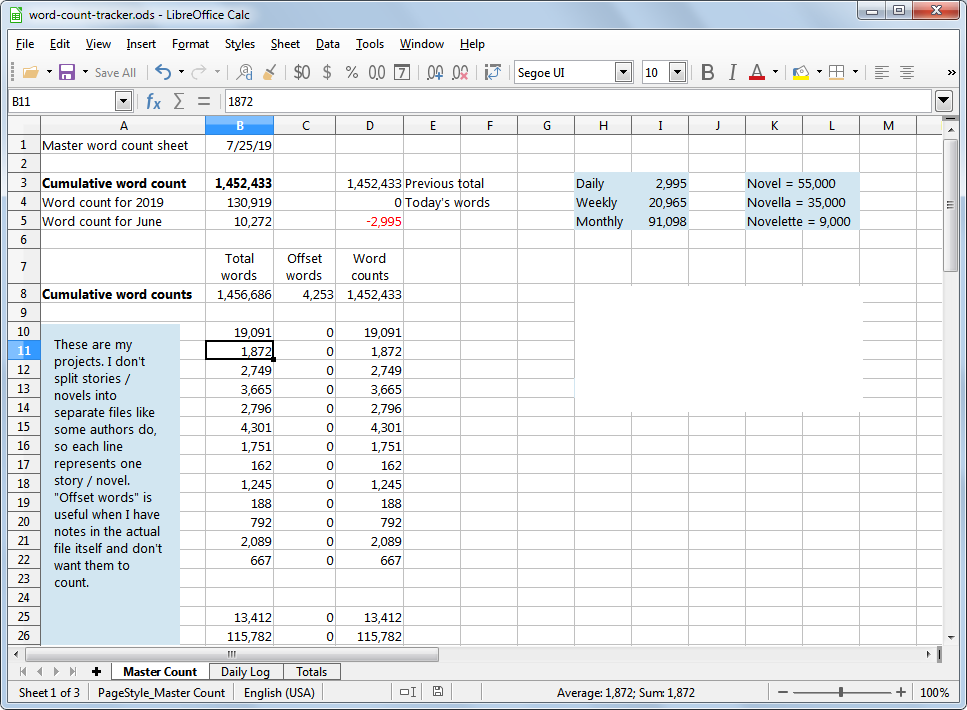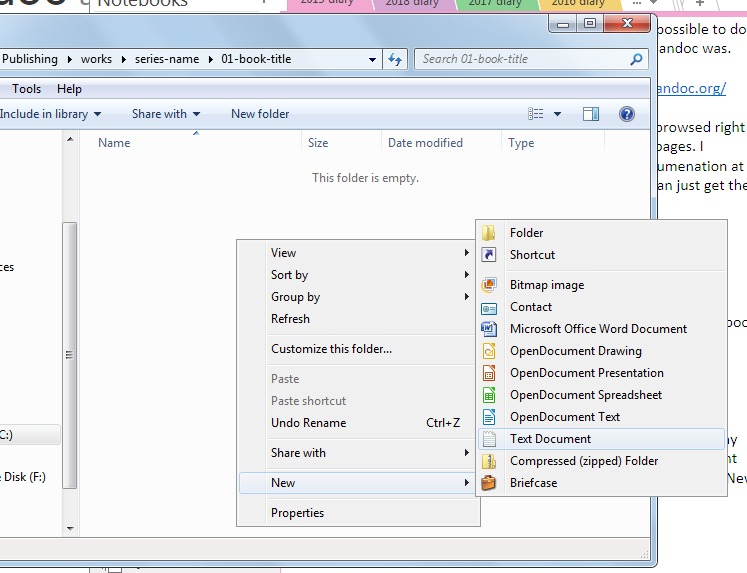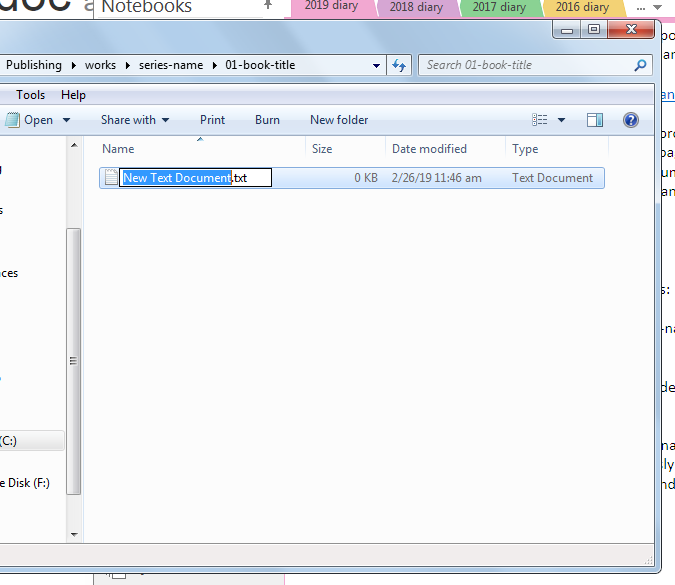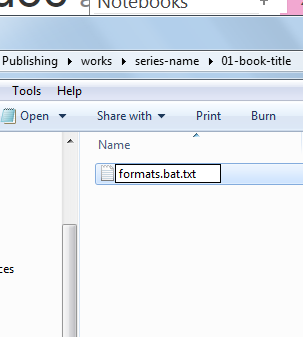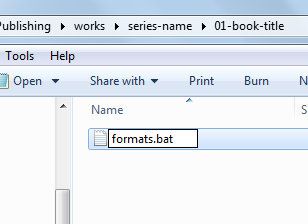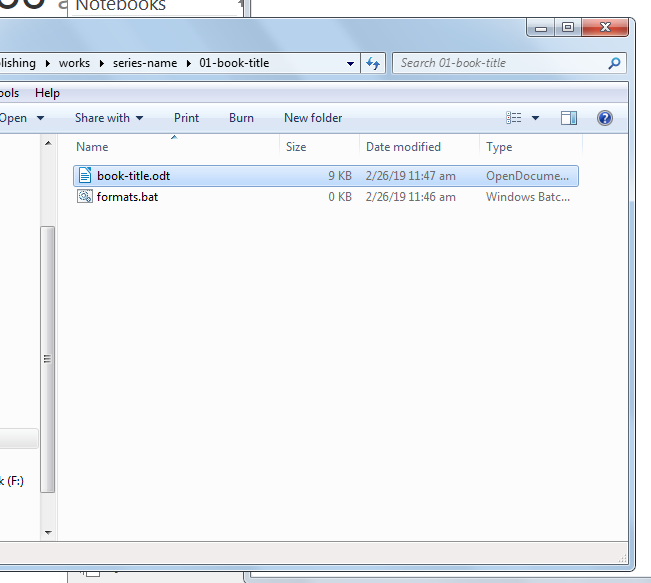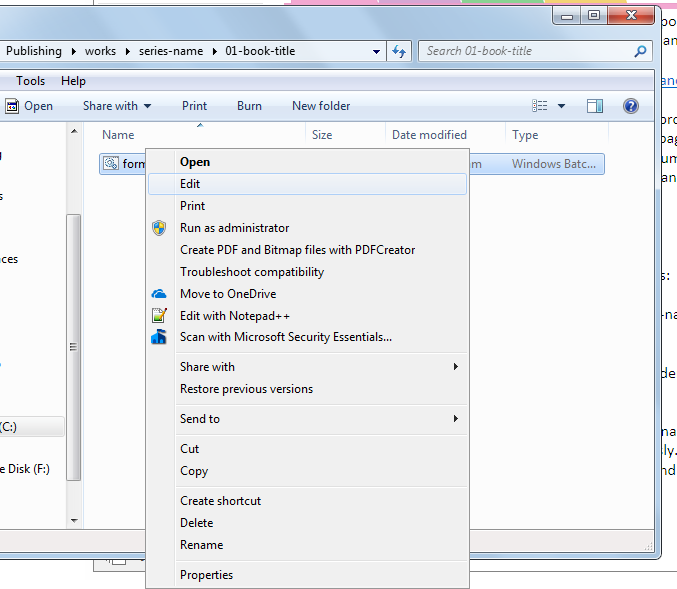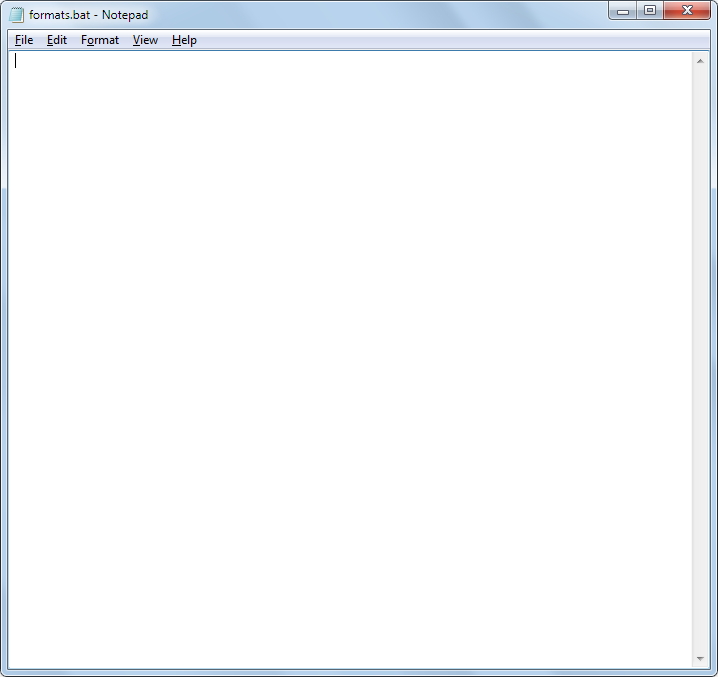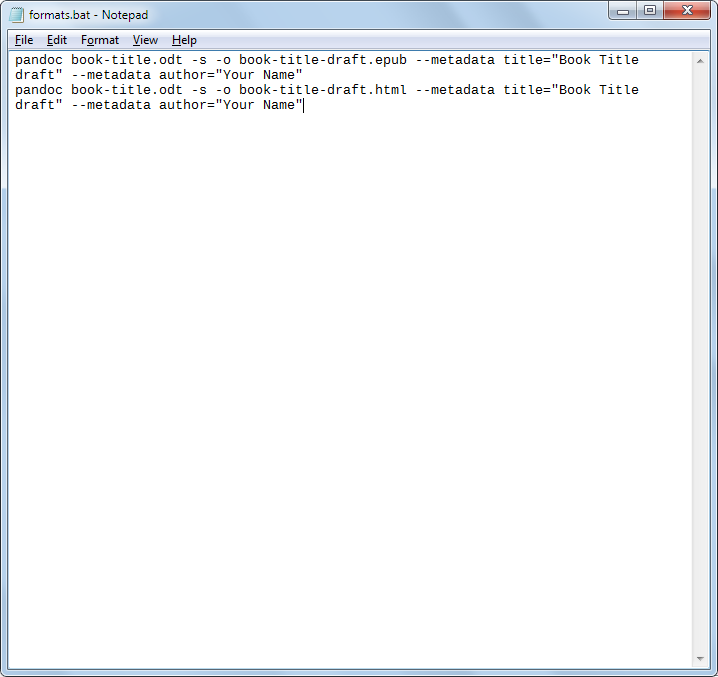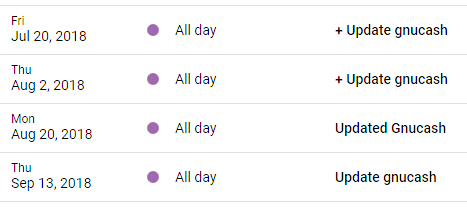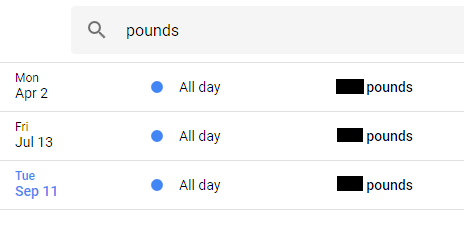Here’s another post about my writing day.
On the one hand, I’m pleased that I started off my plan to write 2,000 words a day somewhat successfully. I ended up with 1,825 words. Not 2,000, but close enough that it won’t drag my average down in the long run (I hope). On the other hand, I’m really disappointed that it took all freaking day to do it, and I didn’t even make it to four solid hours of timed writing. I clocked only 2.67 hours, in fact.
I’m going to say this up front. I have to take breaks between most writing sessions and that’s just the way it is. I pee a lot. I have to move my legs. I can’t sit still for long periods. If I don’t move, I can’t focus. If I don’t click away from my book when I get too wound up, I can’t focus. I need a lot of help focusing, to be blunt.
The most hours of timed writing I’ve ever logged in a day is just over ten and a half and that was the hardest day I’ve ever spent writing. I started early in the morning and I finished late that night. It’s also my record word count day at the moment.
I just cannot sit and write for four hours straight. It’s currently an impossibility for me. I don’t know if it always will be, but I suspect I will never be that person who sits down and doesn’t move until their daily word count has been reached. Well, maybe if my daily word count was like 500 words or something. I might make it. Some days. :)
But one thing I don’t expect is to end up with four hours of timed writing from a 12–4 writing schedule. That’s a completely unreasonable goal for me, and I know it.
But three would be nice. So I’m working on it. I’m going to really focus in on that 12–4 writing time and try to get a consistent three hours of timed writing out of it. The rest of the day? I don’t care. I’ll just do what I can do.
Now back to the post about my writing day. Here’s the log, which I wrote in OneNote yesterday but got too tired to post before I went to bed. It’s long! I recorded a lot of minutia.
- Start at 12 pm and get as close to 4 hours of timed writing in before 4 pm as I can.
- Do 20 minute sessions today to help me stay more focused on speed.
(Although the 60 minute sessions do work to keep me focused during them, I don’t like starting them, and so I always feel like I end up doing less writing in the end. I should confirm that with numbers but maybe some other time.)
12:23 – Just finished my first session of the day.
Session #1 didn’t go great. I ended the session at -22 words. Too much editing of yesterday’s words and no forward momentum at all. I will try to correct that with session #2.
To help limit the necessity of breaks, I had coffee earlier so I could move on to something less likely to force me away from my desk every five minutes. I’m having hot water over lemon and honey, instead.
Now, unfortunately, I do need a quick break. :D Be right back.
12:39 – I’m back and ready to start session #2.
1:00 – Session #2 done. 211 words. Total words: 189. Still in the weeds of yesterday’s work. However, I ended up expanding one conversation and that’s where the new words came from.
I posted an update to my CampNaNoWriMo cabin and to a small writer’s group I’m part of on Discord. Grabbed lunch and am eating at my desk today because I forgot to eat lunch before I started at 12.
1:25 – Ready to start session #3.
1:46 – Session #3 done. 156 words. Total words: 345.
2:06 – I had a short break to check the mail (real mail!) because I saw the postman put a package in the box, and sure enough, it was my keyboard replacement and the fan. I’m still waiting on the frame and I’ve decided to let that come before I dig into the computer for the repairs.
I’m actually liking this temporary keyboard quite a bit. I might continue to use it. We’ll just have to see. Now, time to start session #4.
3:02 – Finished session #4. 357 words. Total words: 702. Don’t know where the rest of my time went. I didn’t leave the computer. I think I looked at few reports or something, and time must have gotten away from me before I clicked “Start” on the timer.
3:36 – A cup of cocoa and coffee later, and I am back. I think the honey and lemon wasn’t such a good alternative to coffee, not for the reason I wanted it as an alternative. The lemon seemed to be just as big an irritant to my bladder as the coffee usually is! But at least with the coffee, I get a little caffeine high. So I won’t be doing that substitution again as a way to cut down on breaks, because it did not cut down on breaks. :)
Starting session #5.
4:00 – Finished session #5. 297 words. Total words: 999. About halfway to my initial 2,000 words goal.
4:17 – Starting session #6.
4:41 – Finished session #6. It was a good one! 388 words. Total words: 1,387. That was a pace of 1,164 words an hour. If I kept that up, I’d be done with my 2,000 in a snap. I’m not holding my breath, but it could happen. :)
4:59 – Starting session #7. Hopefully I’ll get a few of these in before I stop again. I’m wearing myself out here with all the jumping up and down out of my seat.
5:29 – Did not start session #7. I played a game of spider solitaire first. Now I’m starting session #7. I’m actually really kind of sleepy and tired. But I’m going to do at least this one more session before I take a dinner break.
5:58 – And an unexpected interruption derailed that attempt. Starting session #7 now.
6:39 – Finished session #7. 211 words. Total words: 1,598 words. My pace slowed, but yeah, no surprise there.
8:56 – I stopped after the last session for a dinner break. I would have preferred to get my 2,000 words first but time kept getting away from me so I decided to stop early enough to come back after. So here I am. Ready to start session #8.
9:54 – Or not. I played a game of spider solitaire instead, ran some numbers on my spreadsheet, and then dealt with an interruption. I’m going to finish my game of spider solitaire and then start session #8.
I’m disappointed that my 4 hours of writing have taken all day. And that I haven’t reached 2,000 words yet.
I’m giving some thought to what I can do differently but there’s not a lot, not while I have people in the house with me all day. I’m just too prone to distraction and I tolerate too many interruptions, from others and myself.
It would serve me well to get up early and start writing while it’s quiet, but I’ve gotten into a nice routine with the 12–4 schedule and I don’t want to mess that up. I also kind of like not having to jump right into writing. If it were just me here, I don’t there’d be any problem at all with 12–4. It’s just that I’m not here alone most days and won’t be until mid-August, and then only some days, and not even close to most of them.
So, I have to learn to get by even with the interruptions. Things won’t change for a few more years, I expect. Time waits on no one.
10:35 – Alright. I’m done with that game. I’m not finished with it, just done. The biggest impediment to this plan of mine is my laptop’s broken keyboard. I’d love to take my computer up to bed and sit there and do some last minute writing but I can’t, not unless I want to have my space bar doing ridiculous things to my book. So I’d better get started. I’m fast running out of all steam. Pretty soon I’m not going to even care if I reach 2,000 words today and I’ll give up. Happens every time I let myself get sleepy.
Starting session #8 now. Also, my music has reached the “driving me crazy” phase of the day, so I just turned it off, with prejudice.
11:53 – I’m not sure when session 8 ended, but I wrapped up by updating my spreadsheet and then ended up working on the story a little more after that.
Total words for the day: 1,825.
Tomorrow, the only thing I’m going to focus on is staying on task and getting my sessions done. I think I’ll try 30 minute sessions and see how that goes.


